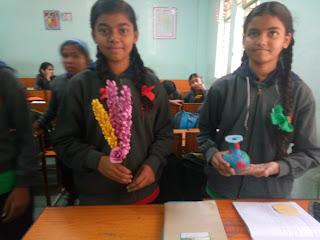LESSON PLAN CL VII ENERGY SOURSE
KENDRIYA VIDYALAYA BIRPUR DEHRADUN
LESSON PLAN
Topic: ENERGY
RESOURCES; ALTERNATING & DIRCET CURRENT
|
Name of Teacher : RAJESH KUMAR Subject : Work Education
Class :VII A,B,C Month: April 2017
|
|
Pre-requisites/Recap
·
“Where does the
energy we use come from?”
·
Is our supply
of energy infinite or finite?
Introduction
·
Sources of electricity are
everywhere in the world. Worldwide, there is a range of energy resources
available to generate electricity. These energy resources fall into two main
categories, often called renewable and non-renewable energy resources. Each
of these resources can be used as a source to generate electricity.
·
If the current
flows always in the same direction, it is called 'direct current'.
·
If the current
changes direction after equal intervals of time, it is called alternating
current
Teachers role
·
Explain sources of energy
·
Discuss major differences
between non-renewable and renewable/alternative energy sources.
·
Explain Renewable
resources which includes solar, wind,hydro, geothermal and biomass.
·
Explain Non-renewable
sources which include nuclear energy and fossil fuels.
·
Define electric current and explain advantages of Alternating
Current over Direct Current
|
|
Students
role
·
To identify non-renewable and
renewable/alternative energy resources
·
Define solar energy,
wind energy, hydro power, geothermal energy, biomass,nuclear energy and
fossil fuels
·
Find out the
contribution of non-renewable and renewable energy resources in fulfilling total
energy requirement
·
Identify various sources of Alternating Current and Direct Current
|
|
Objectives
·
Students will understand how renewable energy provides a clean
source of energy.
·
Students will be able to identify at least five sources of energy.
·
The student will be able to state that the depletion of fossil fuels
is a serious global issue
·
Learn about unit symbol and graph of A.C and D.C
|
|
Resources
used
|
|
Expected Outcomes
·
Students will be able to identify sources of energy.
·
Advantages and limitations of non-renewable
and renewable energy resources
·
What are the
environmental impacts of our energy sources?
·
Identify sources of A.C and D.C
·
Learn about advantages of A. C over D.C
|
|
Activities
·
Identify
the number of renewable energy sources they come into contact with everyday
(sun, wind, water)
·
Collect
the sources of Direct Current
|
|
Assessment
·
Ask the students to give example of non-renewable
and renewable energy resources
·
Ask the students to explain how renewable
energy resources are eco-friendly
·
Ask the students that electric current they are using in school and
at their home are A.C or D.C
|
|
Home Task
·
Draw the Pie chart showing the contribution of various energy
resources used to satisfy energy requirement of the world
·
Draw the wave forms of Alternating current and Direct current
·
Draw the standard symbols used to represent A.C and D.C
|
Teacher’s sign:
____________ Principal’s
sign: _____________
Sources of
Electrical Energy-
There are
various sources of electrical energy-
1- Coal
Energy
2- Hydro
Energy ( Water)
3- Wind
Energy
4- Tidal
Energy
5- Hot
Springs
6- Fuel Like
Petrol/ Diesel
7- Nuclear
energy
8- Petroleum
gas energy

Comments